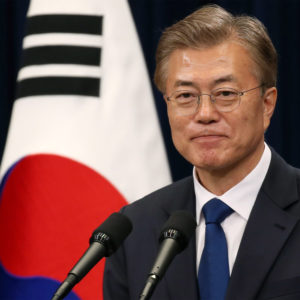SEOUL — South Korea President Moon Jae-in’s idea of a brave new world for Korea, North and South, dissipated in storm clouds soon after he presented his vision on August 15, the 74th anniversary of the Japanese surrender and the end of 35 years of Japanese rule.
No sooner had readers and viewers digested his speech than the North Korean state media were denouncing him as “an impudent guy” with whom the North would never negotiate even after the end of scaled-down U.S.-South Korean war games.
The North Korean commentary was by far the most insulting of any of the responses to Moon’s remarks. Not even the right-wing flag-wavers out on the streets of Seoul on a soggy rainy day were so critical of Moon, who gave many the impression of willingness to cave in to just about anything North Korea’s Kim Kong-un wants.
Paradoxically, while the North Korean reaction was duly reported in the South Korean media, few Koreans, and almost no foreigners, got to read what Korean conservatives thought of Moon’s speech or Seoul’s current policy toward the North. The story of what the thousands carrying South Korean and American flags in central Seoul had to say was downplayed in Korean newspapers and overlooked almost entirely by Korea’s state-controlled broadcast media.
Although Moon turned the other cheek to the North Korean attack, calling yet again for rapprochement, he could not have been happy with the North Korean commentary.
While Moon was extending the olive branch to Japan and expressing hopes for a united Korea by 2045, North Korea was interpreting his words in totally negative terms. In a speech in which Moon sought to soothe the sensitivities of just about everyone, his only slightly critical word was “worrying” as applied to “actions taken by North Korea recently.” He did not even say what these “actions” were, though no one doubted he was referring to Kim Jong-un ordering short-range missile tests as a “warning” to South Korea for engaging in a short-lived command-and-control exercise in which few if any troops actually were seen on the ground, the air or at sea.
Assuming that Kim himself authorized the editorial, he could think of no better way to bully the South at a sensitive time. Kim seems confident that he has President Donald Trump on his side since Trump persists in describing the missile tests as “short-range,” though they’re plenty long enough to hit the huge American base at Pyeongtaek, 65 kilometers southeast of Seoul, which in turn is 45 kilometers south of the Demilitarized Zone at Panmunjom.
Just as heartening for Kim, Trump has got the United States facing South Korea in a debate over the South’s share of the price of having that base, and a few others, on its soil. Trump’s remark that South Korea should fork over $5 billion next year for keeping 28,500 U.S. troops in Korea is too absurd to consider as more than a rhetorical flourish, but the Americans and South Koreans are still arguing over how much more Seoul can afford than the $1 billion paid last year.
In the midst of these talks, there is no reason for South Korean leaders, however left-leaning, to hide the fact that a significant part of their electorate seriously opposes Moon’s unremitting efforts at cozying up to Kim. The North Korean dictator would appear to view Moon as an inferior worthy of talking to only if he thinks he can advance his dual aims first of getting Moon to rule out future war games and, second, of getting the Americans out of the South. (North Korean propaganda persists in spelling “south” with a lowercase “s” as if to show it exists only on paper, temporarily.)
South Koreans of all political persuasions have a right to know that thousands of patriotic flag-wavers did show up in the rain on August 15 hours before thousands of advocates of Moon’s policies showed up later in the day. The lesson here is that Koreans are severely divided between how to deal with the North and, as citizens of a free society, are entitled to knowing all sides of the story.
For Moon and those around him, the lesson should also be that North Korea, no matter what, will treat them all with the utmost contempt. That’s despite Moon’s avoidance of raising topics that infuriate the North, notably its egregious record of human rights abuses. Indeed, in his eagerness to appeal to Kim, Moon has refrained from saying anything remotely critical of the Kim regime other than to mention, almost in passing, those “worrying” deeds.
Moon’s vision of a united Korea is fine. It should be clear by now, however, that Kim envisions uniting Korea on no terms but his own. The flag-wavers rallied passionately to get across that view in the media.
South Koreans need to know, realistically, the inherent danger of making concessions to the North. The media owe it to the public to report what Moon’s critics are saying, loudly, in large numbers, on the streets of the Korean capital.

